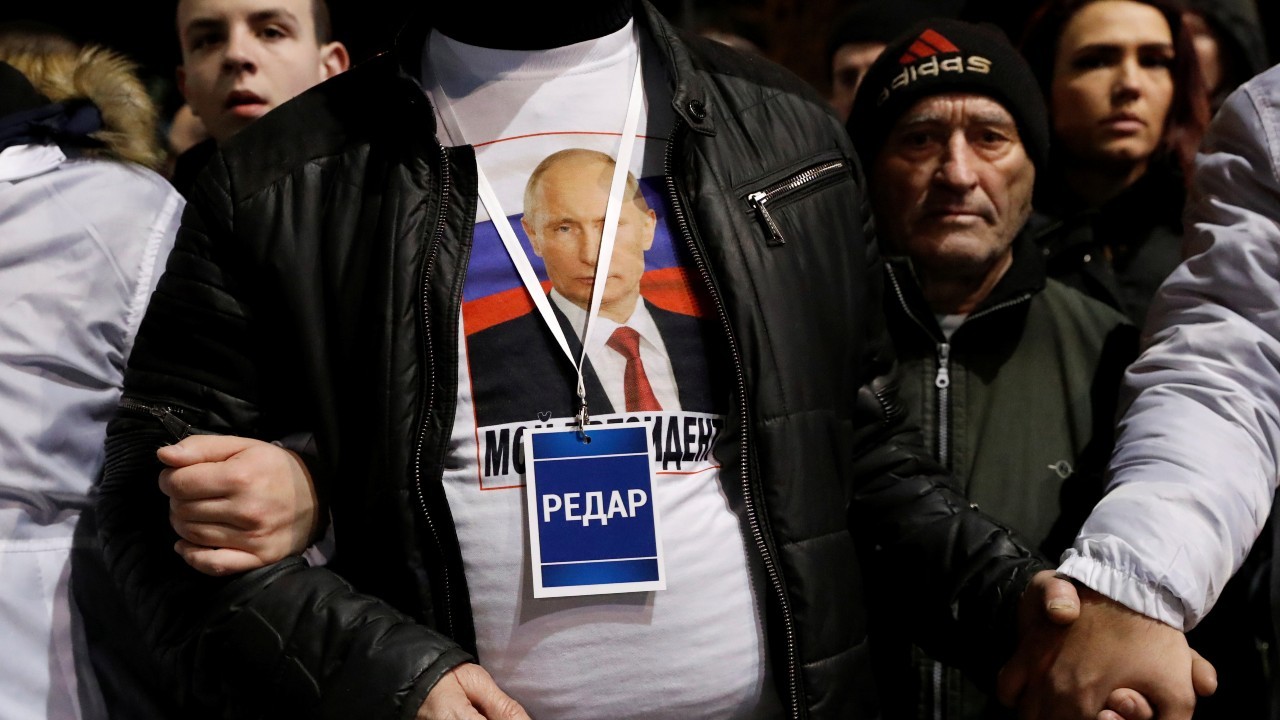#CEEDisinfoWeek is series of articles highlighting the current disinformation landscape in Central and Eastern Europe, and how external and home-grown disinformation has adapted to take advantage of the coronavirus pandemic.
Thousands waited in front of the Belgrade Fair, in mid-February, for the vaccination against covid-19. More than half a million Serbian citizens have received the shot, having had the choice between a Chinese, Russian, or Western vaccine.
Beijing has thus far sent 1.5 million vaccines to Belgrade, while Russia provided approximately 90,000 doses to Serbia, and 8,000 to the Serb entity of Republika Srpska in Bosnia and Herzegovina. The possibility of producing the Sputnik V vaccine in Serbia was also announced.
Local media headlines praise Russian military might and the superiority of their vaccine while at the same time emphasizing divisions within the European Union and their unwillingness to provide vaccines. Additional narratives accuse NATO of being aggressive and Brussels of rejecting Moscow’s benevolent intentions to help. All these stories are based on the reporting of Kremlin disinformation outlets that are provided in the local language free of charge to the Serbian press.
The benefits of vaccine availability and the massive presence of foreign propaganda represent the region’s reality – the growing presence of international actors in Europe’s backyard.
Perceptions among local populations in the Western Balkans are still influenced by the ethnic conflicts in the 1990s and NATO’s Kosovo Air Campaign in March 1999. Home to the Alliance’s only peacekeeping mission in Europe, Kosovo remains an unresolved issue for Serbia which is supported by Beijing and Moscow, both members of the UN Security Council. This complicates relations with Western nations that have recognized Kosovo. While in Bosnia and Herzegovina the EU maintains forces for post-war stabilization in the country that has yet to overcome internal political and ethnic divisions.
Incomplete stabilization and integration of the region have made it open ground for geopolitical rivalries. China is present primarily through infrastructure projects and medical assistance it provided during the pandemic, while Russia has, for years, been conducting a complex hybrid operation consisting of disinformation, energy sector control, military exercises, and the use of humanitarian assistance.
The Kremlin’s goal is to disrupt the integration of the Balkan states into Euro-Atlantic institutions by upsetting regional cooperation; amplifying threat perceptions among the Orthodox Slav population; reinforcing preexisting anti-Western sentiments, and grievances related to NATO military intervention in the 1990s; and advertising Russian military might with anti-Western and nationalistic rhetoric.
Demonizing the United States and NATO; presenting the EU as weak and divided; advertising Russian military might and covid-19 vaccine superiority, and claiming that Western vaccine producers are corrupt; and amplifying threat perceptions, myths, and ethnic tensions – these are among the most frequent topics of disinformation promoted by the Kremlin in the Western Balkans.
Bosnia and Herzegovina, Montenegro, and Serbia are most affected by these information operations that attempt to undermine the European Union and NATO in the region. Due to strong historical, societal, cultural, and language connections the flow of information and disinformation is cross-border in nature.The same goes for the region’s media landscape which is marked by poor implementation of existing laws, clientelism, politicization, corruption, smear campaigns, low editorial standards, the vilification of investigative media, hate crimes, and defamation. In addition, self-censorship is on the rise. The result makes disinformation extremely effective.
Covid-19 proved to be a great opportunity to intensify such efforts, however, this is not the first emergency used for this purpose. Disasters and military exercises have been used for years as a breeding ground for hybrid operations.
In April 2020, transport planes flew in Russian military medical teams that disinfected streets and hospitals throughout Serbia and the Republika Srpska, with great media pomp. It was the only region in Europe, other than Italy, where such activity was conducted.
A year earlier, in 2019, a Russian Ilyushin Il -76 took part in extinguishing fires in eastern Serbia. While the media featured images and spoke of the importance of this contribution, it turned out that the aircraft arrived five days after the fire started, after it was virtually extinguished by rain.
Five years earlier, Serbia faced catastrophic floods. Almost all countries in the region took part in the rescue efforts, the first to arrive were soldiers from Montenegro. However, the arrival of Russian rescuers was accompanied by the biggest media coverage, disproportionate to that of all other nations.
The use of Russian humanitarian assistance in the Balkans began in 2012 with the opening of the Russian-Serbian Humanitarian Center in Nis, Serbia. The United States and the European Union see the facility as an attempt to strengthen Russia’s presence in the region with a strong intelligence component. On numerous occasions Moscow requested Belgrade grant diplomatic status to the staff of the center, however, Belgrade refused, concerned this would endanger relations with the United States and EU.
Eight years later the global covid-19 pandemic created a perfect opportunity to capitalize on the hybrid approach based on humanitarian assistance and disinformation. With massive confusion caused by closed borders, economic disruption, and all-around uncertainty, Kremlin efforts have again proven to be effective.
Daniel Sunter is founder of the defense and security portal, Balkan Security Network, which connects editors, analysts, and journalists in the region and promotes fact-based reporting. He is Executive Director of the Belgrade-based Euro-Atlantic Initiative, which works on communication projects and disinformation analysis.
John Cappello, Founding Partner and Chief Operations Officer of the Balkan Security Network which connects editors, analysts, and journalists in the region and promotes fact-based reporting. He is Chief Operations Officer at the Belgrade-based Euro-Atlantic Initiative, which works on communication projects and disinformation analysis. A 25-year veteran of the United States Air Force John served as U.S. Air Force and Acting Defense Attaché in Belgrade, Serbia; U.S. Air Force Attaché in Tel Aviv, Israel; and as a political-military officer at Headquarters United States European Command, Stuttgart, Germany.




